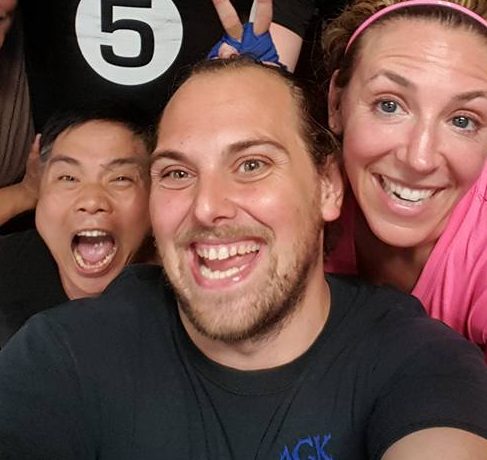There are a lot of activities that are available to children these days that will help them build confidence. In fact, confidence is one of the more common requests that we have from parents who bring their children to Vision Martial Arts.
Parents want us to help bring the kids out of their shells help them with strangers help them try new things and just overall be more confident.
The unique thing about SKILLZ is that confidence isn’t just a byproduct of things that we do, something that just kind of happens. Confidence development designed mindfully into our programs.
There are five main ways that we work to influence a child’s sense of self-efficacy
Self-efficacy is a really big fancy phrase for the child’s ability to believe in themselves to believe that they can accomplish a task or that they can acquire the tools necessary to accomplish those tasks so.
In all of our classes, including Fun Week, we are working on five main areas of focus that help kids feel like they can conquer challenges, and the cool thing is that we as coaches teachers and parents can influence our kids very proactively in each of these areas to help them be more confident.
(Article continues below the video.)
The first one we’re working on is:
Performance Experience
What that means is that we help them think about things that they have they done before, activities have they done in class or in school, such as a similar game, drill, or activity as the task in front of them.
When it’s time to go in and play a new game or try a new activity and they have a little hesitancy we can remind them of times when they faced a similar challenge that they overcame somehow. This has both an intellectual and emotional component, both of which help them use what they’ve learned and how they felt to bolster their confidence.
The second factor for building confidence is:
Vicarious Experience
“Vicarious” is a big word that means essentially “through somebody else,” as in, “to live vicariously through our children.” Vicarious Experience is really powerful, especially for the younger kids, because they have so many mirror neurons in their brain that respond and react to what a child observes from their peers and mentors.
That means is a child can look at a situation where maybe an instructor is going through something that we’ve asked the child to do, and can then say to themselves, “Well, if the instructor can face this challenge then I can face this challenge, too!”
This is one of the reasons why Fun Week is so powerful: because the students get a chance to interact with their instructors, see them fail as they lose at games, and then learn how to move past the failure, to see it just as a learning opportunity. They learn to model the behaviors they observe
The third factor for building confidence is:
Social Persuasion
Social Persuasion includes everything from the comforting embrace of a parent who’s providing a safe space, to the encouragement of an instructor’s pep talk, to a child’s peers egging them on.
We want to provide an environment in which the child knows that, not only should they believe in themselves, but we believe in them.
Kids put a lot of faith and trust in their peers and in their role models, so if we can rally behind them and provide that positive social persuasion, they are more likely to take a risk that may result in success.
On a side note, this is why when a new child, particularly the younger kids, come into our facility, very often they’ll hide behind mommy or daddy’s leg, and sometimes, to help encourage them, mommy or daddy will push them out onto the training floor and say, “Stop being shy. Stop hiding behind me. Go out there and be brave!”
While that’s well-intentioned, it is also often counterproductive because the child is more likely to go out and be brave if we give them that time behind us where they can observe and take it all in, absorb what is happening, and make that decision to step out.
Pushing them prematurely creates a more stressful situation, which kids sometimes tie to fears of abandonment, thereby decreasing the levels of self-efficacy.
The fourth factor affecting confidence is:
Physical and Emotional State
Psychologist Abraham Maslow states that a child’s most base needs must be met before they can get out there and try to learn or do any of the higher processes involved in healthy risk-taking or success.
The environment we create during Fun Week is fun, charged with positive emotion, and lots of oxytocin and endorphins (positive feel-good neurotransmitters) being stimulated. These great experiential learning processes are going on, and the child is more likely to be able to take in and absorb all this information.
On the other hand, if a child is tired, maybe just woke up from a nap before they came to class, if they are hungry and cranky or they’re just not feeling well that day, then they will feel less confident about their abilities.
As adults, we recognize that we can wake up on the wrong side of the bed and just have a bad day during which we don’t feel up to performing. Kids have those days, too, and we need to let them; it’s part of being human.
Learning how to adapt to and overcome those physical and emotional challenges is important. So, too, is recognizing that, if people can have good days and bad days, that means that you can have days during which you are more confident and days when you are less confident.
We don’t want to define self-efficacy just by a single incidence of, “my child wouldn’t try,” or, “my child had a challenge.” We want to look overall at that child’s development and observe trends across a wide variety of activities before we start worrying or labeling.
Finally, the fifth way that we work to influence a child’s sense of self-efficacy is”
Imaginal Experience
That word “imaginal” sounds like “imaginary,” and that’s a large part of what it means. It has to do with taking all of these other factors — how they feel, what they’ve been told, what they’ve done in the past, what they’ve seen their peers do — and now they put it all together by imagining what will happen if they try something new.
We want a child’s imagination to be very positive because we know from research in the fields of psychology and neuroscience that, when we believe strongly in an idea, it is more likely to come true.
This is a result of the Reticular Activating System in your brain. The RAS, among other functions, looks for ways to make your thoughts come true. This is why things like positive affirmations work so well.
A child’s imaginal experience is very powerful to them; in some cases, it is so powerful that it almost feels real. When it feels real, it can affect the child’s perception of the real world.
Putting It All Together
With all of these factors in mind, we can encourage kids to have more confidence by guiding the visualizations that they’re having by, for example, helping them remember a time that they overcame a challenge, or watching how their best friend did it, and by reminding them that we are always here for them, and that, even if it doesn’t work, we’re still going to be their friend or love them completely.
By helping kids by using certain emotional cues to through remembering a time when they felt empowered, we empower them to bring all of these things into a very realistic mental visualization that includes their desired outcome: success.
When we have all five of these factors in place, humming along and purring, that child is going to have a very powerful sense that they are efficacious, that they have self-efficacy, and that they should believe in themselves.
When they believe it they can be it, and that’s really what we want to provide through our classes, and through our parenting and coaching experiences.
To learn more about the powerful Skillz child development program that uses elements of martial arts training as the vehicle for growth, or to get your child started at our Patchogue location, click the button below:
VISION MARTIAL ARTS
218 Medford Ave
Patchogue, NY 11772

Author: Michael A Evans
Michael is a 6th-degree black sash under his teacher, Moises Arocho, and has been training in martial arts since 1985. Michael has a degree in Massage Therapy from NY College of Health Professions. He is the co-owner of Vision Martial Arts in Patchogue, NY. Michael is also the Lead Consultant for Skillz Worldwide

















